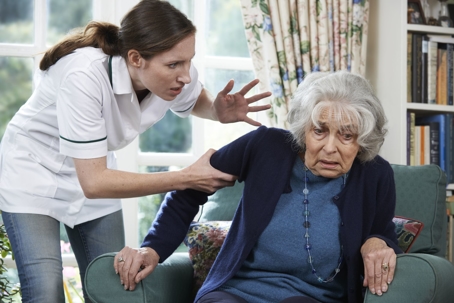Elder abuse is extremely common in nursing homes. Since 2017, several disturbing reports have come before the US Senate, yet the numbers are still rising year after year. This is unacceptable.
Our country needs nursing home reform. Until that time, family, friends, and nursing home staff should educate themselves about the types of nursing home abuse as outlined by the National Institute on Aging and the National Center on Elder Abuse.
Physical Abuse
Physical abuse is the most common form of elder abuse. It’s also the most easily identifiable. This type of abuse occurs when nursing home staff take violent action against an elder. While the symptoms vary greatly, make no mistake that is not merely elder abuse, but criminal assault and battery.
Signs of physical abuse include:
· Unexplained Bruises
· Black eyes
· Welts
· Cuts or scars
· Unexplained sprains
· Dislocated arms or fingers
· Fractures or casts
· Ripped clothes
· The elder says they were attacked
· Nursing home staff refuse visitors
Many of these signs are obvious and warrant immediate consultation with an experienced nursing home attorney, as well as the immediate removal of the elder from the nursing home if at all possible.
Emotional Abuse
Emotional abuse occurs when nursing home staff manipulate the elders in their care through a combination of verbal assault and psychological torment. There are many forms of this, including name-calling, infantilization, threats and intimidation, social isolation, and even gaslighting.
Signs of emotional abuse include:
· The elder seems depressed
· The elder seems upset or angry
· The elder experiences panic or anxiety
· The elder claims they are being mistreated.
· The elder is uncharacteristically silent or refuses to talk.
Emotional abuse may also take the form of violence between residents caused by abusive nursing home staff. Several cases have come forward involving nursing home staff who encouraged elders to physically assault each other.
This type of nursing home abuse can seem difficult to detect. However, friends and family should trust and believe elders and have a discussion with them if they exhibit signs of emotional distress or abuse.
Neglect
Nursing home neglect refers to a failure to provide an elder with fundamental necessities and basic hygiene. Neglect is a failure of nursing home staff to fulfill the most basic duties of their job. The damages caused by neglect are ongoing and can cause an elder’s mental and physical condition to deteriorate
Signs of elder neglect include:
· Malnutrition or weight loss.
· Dehydration
· Lack of heating or cooling
· Lack of clean water.
· Unsanitary living conditions
· Failure to administer medication
· Bedsores
Bedsores are an egregious form of neglect as they often accompany other conditions, such as malnutrition and unsanitary lodging. Moreover, an immobile elder with bedsores may be forced to sit in their waste, increasing the chances of infection when combined with a deep, late-stage bedsore.
Financial Exploitation
Financial exploitation can include acts of dishonesty by nursing home staff that results in lost funds or property. This includes anything from petty theft of the elder’s possessions, forgery, transferring money to a staff member, or even convincing the elder to change their will.
This type of abuse is less common in nursing homes and can often be difficult to detect. Financial exploitation is more common among estranged relatives and service providers.
Sexual Abuse
As terrible as it may be, sexual abuse is a very real problem in many nursing homes. It’s important to understand how this abuse occurs. Some nursing home residents are nonverbal or suffering from a mental illness, meaning they cannot consent.
Even if an elder gave their consent, nursing home staff cannot have sexual relations with the people in their care. To do so is almost always a violation of employee policy and is a clear violation of the code of medical ethics.
More often, sexual abuse in a nursing home is the result of criminal rape or a combination of physical and emotional abuse. Despite this, studies suggest elders reporting sexual abuse are less likely to be believed by staff and family than other age demographics.
Signs of sexual abuse can be more difficult to identify due to their inherent intimacy, but they may include:
· Unexplained pelvic injuries
· Unexplained STDs
· Genital or anal bleeding
· Bloody underwear
· Improper touching with nursing home staff
· Improper sexually-oriented dialogue with nursing home staff
· Signs of emotional abuse
· Signs of physical abuse, especially bruises and ligature marks
· Nursing home staff refuses visitation
· Symptoms of PTSD
· Suicidal behavior
Influence Positive Change
People are living longer than ever, and that means a rapidly increasing number of nursing home residents in the near future. The nursing home industry needs reform, but that takes time. Until that happens, all nursing home visitors have an obligation to report elder abuse.
Elder abuse is often criminal. Negligent and abusive staff members should answer for their crimes and face the consequences of their actions. Moreover, elders should be removed from the site and relocated to a safe place.
Influencing positive change starts by listening to elders and believing them when they report nursing home abuse. Elders often need their friends and family to pursue justice and the compensation they deserve. Each of us has a duty to listen, observe, and assist our elders in their darkest hour.
If someone you love suffered from nursing home abuse, you might have a case. If you’d like to schedule a free case consultation with an experienced Virginia personal injury attorney from the Obenshain law group, please don’t hesitate to send us an email or call (540) 318-7360.
